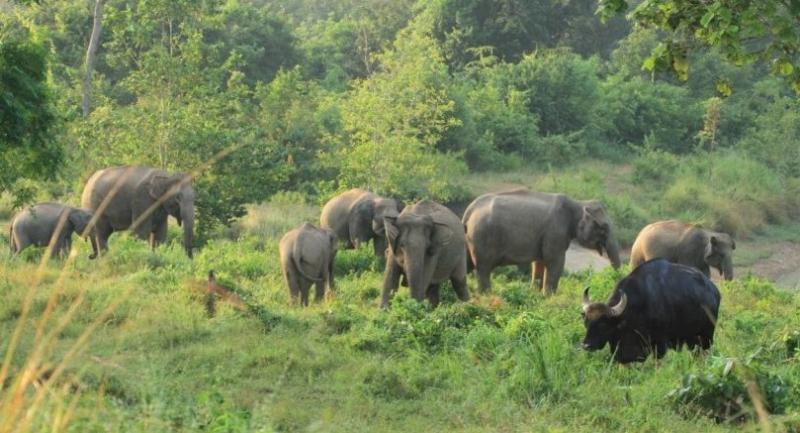Kuiburi National Park plan aims to contain human-elephant conflict

KUIBURI National Park is seeking approval for an initiative that will turn things around for farmers threatened by roaming wild elephants, and will deliver benefits to the locals.

Designed to prevent pachyderm-human conflicts from aggravating, the initiative aims to ensure local farmers earn extra income while guarding against the giant animals from wandering into their neighbourhood.
“We will pay locals Bt7,500 a month for night patrols,” the park’s superintendent, Thussanad Pechkong, revealed earlier this week. “And we will do much more.”
Elephants have been a menace for decades to people living near forest zones across Thailand with numerous cases of invasion of farms and houses. Sometimes, confrontations have become bloody and led to casualties on both sides.
Kuiburi National Park, which sits in Prachuap Khiri Khan province, has already drawn up a plan to employ 36 villagers and farmers from nearby villages such as Yan Sue and Ruam Thai as elephant-response staff to support the 28 rangers.
“The team will keep wild elephants away from farmlands. This way, locals can prevent damage to their produce and also earn extra income,” Thussanad said. He revealed that pineapples seemed to be the most tempting crop for the pachyderms.

He assured all sides that the team would definitely not harm wild elephants.
“Team members will only use a torch, and if necessary also firecrackers to push the wild elephants back into the forests,” Thussanad said.
According to the Department of National Parks, Wildlife and Plant Conservation, there are 3,100 to 3,300 elephants in Thailand. Kuiburi National Park has been home to about 300 of them.
“Of the total, up to 50 of them often wander out into the plantations and destroy crops near our park,” Thussanad said. Usually they come out one at a time, but sometimes as many as 28 elephants may come rampaging and destroy the crop in one attack, he said.
Chidapa Oiumao, who lives in Ruam Thai village, one of the hotspots, said the farmers in her village had to stay outside during the night to watch out for the elephants.
The farmers have tried using an electric fence and dug a ditch to protect the crops, but none of that worked.
“Now I hear the sounds of firecrackers every day,” she said.
“The villagers are very skilled, as they have always been dealing with elephants since young,” Thussanad said. He expected the initiative to stop casualties caused by the human-elephant conflict.

Thussanad is now in discussions with Monitoring of Illegal Killings of Elephants programme (MIKE), which receives funding from the European Union, to ask for support.
If possible, he hopes to equip the elephant-response team with night-vision drones. Drones can help rangers anticipate a conflict before it even happens. For example, when elephants start moving outside the forest and step into the buffer zone, the response team can take action.
“We intend to back the initiative and will decide how we can help,” said Say Lin Ong, MIKE subregional support officer, who is now based in Thailand.
European Union Ambassador Pirkka Tapiola, who visited Kuiburi National Park on Wednesday and Thursday, said he was impressed by the level of community engagement and the dedication of the park rangers to mitigate human-elephant conflicts. “I think it is a beautiful part of the work that I see the community becoming a part of the process.”
During the visit, the ambassador and his son also participated in the sighting of wild elephants. The safari is another Kuiburi Park initiative to mitigate tensions between farmers and wild elephants. For a fee of Bt850 plus park entrance, a group of 8 to 10 tourists can get a pickup truck, a driver, a local tour guide, and a chance to see elephant herds and other rare species in the wild. The trucks that take tourists are actually used to transport pineapples, and the drivers and guides are local farmers and villagers affected by wild elephants.

According to Chidapa, who also works part-time as a guide, each month the guide can earn up to Bt6,000.
However, the park superintendent said the park would remain a sanctuary for wildlife. The park is home to more than 300 wild elephants, 300 gaur, and other rare species such as great hornbills and bantengs.
Tourists can visit only from 1pm to 6pm. The number of daily visitors is capped at 400 to avoid disturbing wildlife, and most of the national park is off-limits to tourists, said park superintendent Thussanad.
“I am very impressed with the dedication of the rangers of the national park to protect the biodiversity of the country. They also give space to the animals. Even if there are tourists driving around, they are kept very clearly on the routes,” the EU ambassador said.
